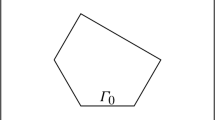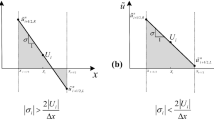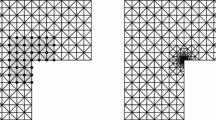Abstract
The \(hp\)-FEM is an adaptive version of the Finite Element Method (FEM) that is capable of achieving fast exponential convergence rates by combining optimally spatial refinements (\(h\)-adaptivity) with varying element polynomial degrees (\(p\)-adaptivity). We present a novel space-time adaptive \(hp\)-FEM algorithm that is capable of capturing accurately traveling sharp fronts in nonlinear time-dependent problems. The algorithm tries to assess the true approximation error directly (not via residuals or related techniques), and it does not involve any tuning parameters exposed to the user. The algorithm is compared to non-adaptive FEM as well as to adaptive FEM with low-order elements in the context of a model problem with moving sharp front that consists of two coupled nonlinear parabolic equations. Also the treatment of nonlinear terms is discussed and it is shown that replacing the Newton’s method with simpler linearizations can lead to considerable errors.













Similar content being viewed by others
Notes
For download, tutorial, and examples visit http://hpfem.org/.
References
Babuska I, Feistauer M, Solin P (2001) On one approach to a posteriori error estimates for evolution problems solved by the method of lines. Numer Math 89:225–256
Chen Z, Feng J (2004) An adaptive finite element algorithm with reliable and efficient error control for linear parabolic problems. Math Comput 73:1167–1193
Deuflhard P, Bornemann F (2001) Scientific computing with ordinary differential equations. Springer, Berlin
Dubcova L, Solin P, Cerveny J, Kus P (2010) Space and time adaptive two-mesh hp-FEM for transient microwave heating problems. Electromagnetics 30(1):23–40
Dunne T, Rannacher R (2006) Adaptive finite element simulation of fluid structure interaction based on an Eulerian variational formulation. In: Bungartz H-J, Schfer Michael (eds) Fluid-structure interaction modelling, simulation, optimization. Springer, Berlin
Eriksson K, Johnson C, Logg A (2004) Adaptive computational methods for parabolic prob- lems. In: Stein E, de Borst R, Hughes TJR (eds) Encyclopedia of computational mechanics, vol 1, Chap 24. Wiley, New York
Eriksson K, Johnson C (1991) Adaptive finite element methods for parabolic problem. I: a linear model problem. SIAM J Numer Anal 28:43–77
Hairer E, Norsett SP, Wanner G (1987) Solving Ordinary Differential Equations, I: Non- stiff Problems. In: Springer Series in Computational Mathematics, 8. Springer, Heidelberg
Hairer E, Wanner G (1991) Solving ordinary differential equations, II: stiff and differential- algebraic problems. In: Springer Series in Computational Mathematics, 14. Springer, Heidelberg
Hoffman J, Johnson C (2003) Adaptive finite element methods for incompressible fluid flow. In: Barth T, Deconinck H (eds), pp. 97–157.
Knudsen E, Pitsch H (2008) A dynamic model for the turbulent burning velocity for large eddy simulation of premixed combustion. Combustion Flame 154(4):740–760
Kuzmin D, Turek S (2004) Numerical simulation of turbulent bubbly flows. In: Celata GP, Di Marco P, Mariani A, Shah RK (eds) Two-Phase Flow Modeling and Experimentation, vol I. Edizioni ETS, Pisa, pp 179–188
Lang J (2001) Adaptive multilevel solution of nonlinear parabolic PDE systems: theory, algorithm and applications. In: Lecture Notes in Computational Science and Engineering, 16. Springer, Berlin
Picasso M (1998) Adaptive finite elements for a linear parabolic problem. Comput Methods Appl Mech Eng 167:223–237
Rachowicz W, Demkowicz L (2002) An \(hp\)-adaptive finite element method for electromagnetics. Part II. A 3D implementation. Int J Numer Methods Eng 53:147–180
Schnepp S, Weiland T (2012) Efficient large scale electromagnetic simulations using dynamically adapted meshes with the discontinuous Galerkin method, J Comput Appl Math, 236
Solin P, Cerveny J, Dolezel I (2008) Arbitrary-level hanging nodes and automatic adaptivity in the \(hp\)-FEM. Math Comput Simul 77:117–132
Solin P, Cerveny J, Dubcova L, Andrs D (2010) Monolithic discretization of linear thermoelasticity problems via adaptive multimesh hp-FEM. J Comput Appl Math 234:2350–2357
Solin P, Dubcova L, Kruis J (2010) Adaptive hp-FEM with dynamical meshes for transient heat and moisture transfer problems. J Comput Appl Math 233:3103–3112
Solin P, Demkowicz L (2004) Goal-oriented hp-adaptivity for elliptic problems. Comput Methods Appl Mech Eng 193:449–468
Solin P, Segeth K, Dolezel I (2003) Higher-order finite element methods. Chapman & Hall/CRC Press, London
Süli E, Houston P (2003) Adaptive finite element approximations of hyperbolic problems. In: Barth T, Deconinck H (eds) pp. 269–344.
Tadmor E (1991) Local error estimates for discontinuous solutions of nonlinear hyperbolic equations. SIAM J Numer Anal 28:891–906
Acknowledgments
This research was supported by the U.S. Department of Energy Battelle Energy Alliance Contract No. 89911, and by the Grant No. P105/10/1682 of the Grant Agency of the Czech Republic.
Author information
Authors and Affiliations
Corresponding author
Rights and permissions
About this article
Cite this article
Solin, P., Korous, L. Space-time adaptive \(hp\)-FEM for problems with traveling sharp fronts. Computing 95 (Suppl 1), 709–722 (2013). https://doi.org/10.1007/s00607-012-0243-7
Received:
Accepted:
Published:
Issue Date:
DOI: https://doi.org/10.1007/s00607-012-0243-7




